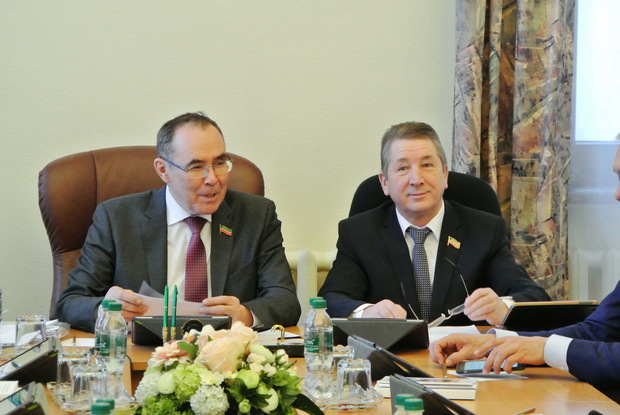Tatarstan parliamentarians advised to feed cudsters with cow ‘energy feed’
Food import has decreased by $5.5 billion for the year
On 2 February at joint meeting of the Committee of State Council of RT on ecology, management of natural resources, agro-industrial and food policy and the Comission of State Council of RT on monitoring the implementation of the state programme 'The development of agriculture and regulation of markets of agricultural products, raw materials and food in the Republic of Tatarstan for 2013-2020' in 2015 and plans for the first quarter of 2016, the deputies and invitees listened to the positive report of an official of the Ministry of Agriculture. However, behind the rosy numbers, as it turned out, there are serious flaws. Details – in the report of Realnoe Vremya.
Import of agricultural products has decreased from 40 to 34.5 billion dollars
The chairperson of the Committee of State Council of RT on ecology, management of natural resources, agro-industrial and food policy Takhir Khadeev took the first floor. He noted that in the context of sanctions and counter-sanctions (that limited mainly food import), agricultural sector handled with its tasks, having prevented food deficit. However, these figures indicate that overcoming import dependency is in the distant future.
'For that time we managed to decrease the amount of import products, that were at 40 billion dollars, last year this figure decreased to 5.5 billion – it is good,' noted Khadeev.
Also, the chairperson of Committee noted the achievements of RT in providing food security. Despite unfavourable conditions, it was gathered a sufficient amount of grain, sugar beet.
'Milk yield accounted for 1 700 000 tonnes – it is the largest amount in the Russian Federation,' told Khadeev.

The crisis is a piece of cake for villages, for the year the agricultural sector has grown by 4.7%
The next speaker was the Deputy Minister of Agriculture and Food on economy and agricultural reforms Rishat Khabipov, who reported about the implementation of the state programme 'Development of agriculture and regulation of markets of agricultural products, raw materials and food in the Republic of Tatarstan for 2013-2020'.
According to Khabipov, sown area remained at the level of the previous years and amounted to 2.9 million hectares. Grain harvest accounted for 3.6 million tonnes with crop capacity of 21.2 centners per hectare.
'Last year, the gross production in current prices according to the calculations totaled 213.7 billion rubles and in comparison with January-December 2014 amounted to 104.7% of growth,' noted Khabipov.
Crop production has increased by 8.9% for the year (perhaps, this is due to the droughts of previous years), but the livestock production – only by 0.9%. There are difficulties with potatoes. Khabipov noted that the crop raising industry need state support this year.
A detailed report of the Deputy Minister of Agriculture of the Republic of Tatarstan took only 10 minutes. After the speech, Takhir Khadeev urged his colleagues to ask questions, and then there was a pause, apparently, the Deputy Minister detailed all the facts.

RedBull for cows
But then it became clear that the deputies master the art of exposure of rosy figures. In the first place, it fell to the lot of such difficult topic as milk yield. There were several scandals connected with terms such as 'false reporting' and other not so nice words for statistics. A few years ago, the National Union of Milk Producers called into doubt the methodology of calculating milk yields.
It turned out that, despite the leadership in milk production, each Tatarstan cow is inferior to many of its colleagues from other regions.
'People also does not stand in one place, we milk 13 litres per cow, Vladimir (our neighbour) milks 17 litres today; Moscow region – 17.8, Mari El – 14.6. Yes, there is no cattle stock there, honestly, but you are responsible for the production, then answer, why do our colleagues succeed?' asked Takhir Khadeev.
Tatarstan keeps the lead only due to a large amount of livestock, however, if not to increase the average efficiency of the individual cow, then it can say goodbye to that status.

Rishat Khabipov recognized the problem, and, as it turned out, the Ministry was really puzzled with the problem and found out why the neighbor's cows give more milk. The reason is that the feed is more energetical.
While Tatarstan's farmers are feeding cows with fodder and silage, their colleagues from more successful regions include and corn, and rape, and silage. According to Khabipov, it is quite possible to advance to more successful performance if to change a ratio.